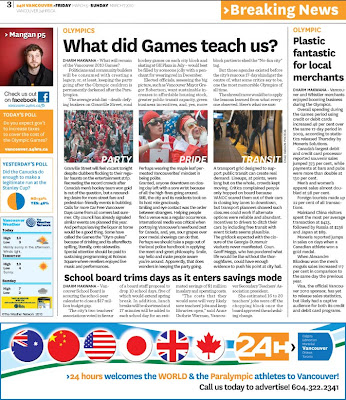What will remain of the Vancouver 2010 Games?
Politicians and community builders will be consumed with creating a legacy, or, at least, keeping the party going after the Olympic cauldron was snuffed.
The average wish list – death-defying buskers on Granville Street, road hockey games at the end of each city block and skating at GE Plaza in July – would best be filled by someone jolly with a penchant for wearing red in December.
Elected officials, assessing the big picture, such as Vancouver Mayor Gregor Robertson, want sustainable increases to the affordable housing stock, greater public transit capacity, green business incentives, and, yes, a few more block parties to shed Vancouver’s “no-fun city” tag.
But those agendas existed well before Vancouver experienced a raucous 17-day shindig at the centre of, what some critics say to be, one the most memorable Olympics Games of all time.
The shrewd move would be to apply the lessons learned from what everyone observed and here are just a few:
Transportation
A transportation grid designed to support public transit can create real demand.
The lineups for rapid transit, at points, were three trains deep but on the whole crowds kept moving to and from Olympic venues with manageable delays.
Critics often too quickly complain people hopped on board loser-cruisers because VANOC scared them right out of their cars by closing on key arteries and lanes connecting to the downtown core.
Viewed from a different lens transportation planners showed such closures could continue to work without becoming a complete nuisance to drivers if alternate transit options are reliable and in supply.
Add on incentives given to drivers to ditch their gas-guzzlers by including free transit trips with each event ticket and the possibility for similar promotions down the road seems plausible.
All eyes are on you Vancouver Canucks.
Even, Olympic gridlock expected to arrive with the closure of the Georgia and Dunsmuir viaducts never manifested to the point many had feared.
Coun. Geoff Meggs, who wondered out loud a year ago on what life would be like without the elevated highways could have enough evidence to push his point at city hall.
Entertainment
Granville Street will feel vacant tonight despite club goers flocking to their regular haunts in the entertainment district.
Recreating the record crowd caused by Canada’s men’s hockey team grabbing gold is out of the question but a resounding desire for more street festivals and pedestrian friendly events is bubbling to Vancouver’s surface.
Calls for more Car Free Vancouver Days came from all corners last summer when four Vancouver neighbourhoods closed to carbon-spewing autos.
Mayor Robertson and council have already signalled similar events are scheduled for this year, though they’ll likely lack the same draws such as international houses and beer tents to fuel the crowd.
And perhaps leaving the liquor at home would be a good thing.
Some have called the Olympics the “Olym-pukes” because of the over-drinking and its associated consequences spilling, literally, onto sidewalks.
Special attention should be paid to sustaining programming at Robson Square where revellers enjoyed live music and performances through the Games.
Pride
Perhaps by wearing the red maple leaf for 17 days an integral part of Canadiana invaded Vancouverites through osmosis – being polite.
Granted, anyone downtown the Olympics closing day left with a wrist ache because of all the high-fives going around.
Still, the city and its residents took on the role of host graciously.
Smiling and eye contact was in play between strangers.
Even, assisting people to find a venue, even though they may have only come from as far as Richmond, was a regular event on the streets and sidewalks.
International media was critical when portraying Vancouver’s newfound zest of Canada, and, yes, sour grapes over poor medal showings can do that.
Neither the experts nor the critics have an answer on how to keep the feelings of pride and camaraderie going.
So perhaps we should take a page out of the Vancouver police handbook in applying the meet-and-greet philosophy.
Smile, say hello, and make people aware that you’re around.
Apparently, that does wonders in keeping the party going.
skip to main |
skip to sidebar
Sketch
- Reporter
- Dharm Makwana currently serves as a web editor at The Province, British Columbia's best read daily newspaper. For more than four years he wrote on issues affecting the Lower Mainland for the province's third largest daily newspaper Vancouver 24 hours. Before arriving in Vancouver in January 2007, Dharm won the John Lott Scholarship for outstanding journalism at Centennial College. Since then Dharm has developed an interest in municipal and provincial politics, crime and policing and social issues including immigration, prostitution and trafficking. He is currently working on a series of stories involving Vancouver's sex workers.
Wisdom
I don't want to be that guy mumbling into his drink at a bar.
-Bill Murray
-Bill Murray
